External links
- Amazzoni e computer: Interview with Gianluigi Zuddas (in Italian)
Gianluigi Zuddas (born 1943) is an Italian author and translator of science fiction. His first novel, Amazon, won a Premio Italia prize.
Zuddas was born at Carpi, near Modena, but moved to Livorno with his family when he was very young. Many biographies list the latter as his birthplace. His father was a non-commissioned Navy officer. He was a keen reader of Salgari, Zane Grey and Steinbeck as a child. He took a liking to Frederik Pohl and Robert Sheckley's sociological science fiction as well as Jack Vance's stories in his early teens.
He tried his hand at various jobs including metal worker, mechanic, technician in medical radiology, and painter, before deciding to write fantasy stories. His first novel, Amazon, won a prize in Italy. After 1989, translation jobs did not leave much time for him to go on with his own writing. Despite this, in 2006 he released a novel entitled C'era una volta un computer ("There Was Once a Computer") which was featured in the sci-fi magazine Urania the following year. In that novel, Zuddas reviewed, remade, and expanded on his previous story, "Le armi della Lupa.
In Zuddas' stories, the main character is usually female. His Amazons are more realistic than the more fantastical ones that readers and movie-goers generally observe in other works.
Zuddas considers his Amazon stories as heroic fantasies. He prefers human-centred explanations over events and phenomena in which one attempts to locate extraterrestrial beings.
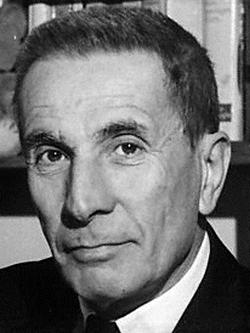
Dino Buzzati-Traverso was an Italian novelist, short story writer, painter and poet, as well as a journalist for Corriere della Sera. His worldwide fame is mostly due to his novel The Tartar Steppe, although he is also known for his well-received collections of short stories.

Giuseppe Avati, better known as Pupi Avati, is an Italian film director, producer, and screenwriter. He is known to horror film fans for his two giallo masterpieces, The House with Laughing Windows (1976) and Zeder (1983).
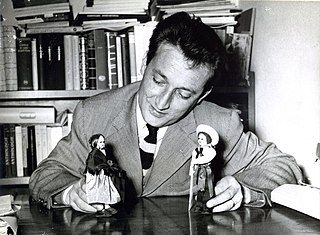
Giovanni Francesco "Gianni" Rodari was an Italian writer and journalist, most famous for his works of children's literature, notably Il romanzo di Cipollino. For his lasting contribution as a children's author he received the biennial Hans Christian Andersen Medal in 1970. He is considered as Italy's most important 20th-century children's author and his books have been translated into many languages, though few have been published in English.
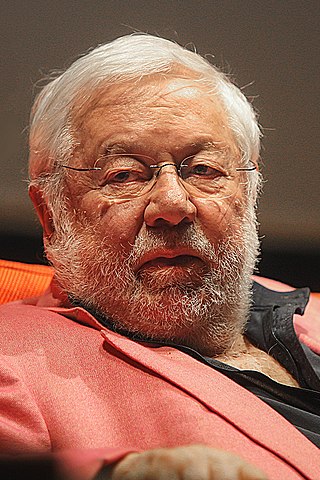
Paolo Villaggio was an Italian actor, voice actor, writer, director and comedian. He is noted for the characters he created with paradoxical and grotesque characteristics: Professor Kranz, the ultra-timid Giandomenico Fracchia, and the obsequious and meek accountant Ugo Fantozzi, perhaps the favourite character in Italian comedy. He wrote several books, usually of satirical character. He also acted in dramatic roles, and appeared in several movies.
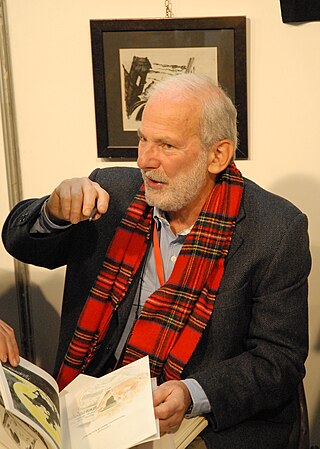
Vittorio Giardino is an Italian comic artist.

Riccardo Bacchelli was an Italian writer. In 1927 he was one of the founders of the review La Ronda and Bagutta Prize for literature. He was nominated for the Nobel Prize in Literature eight times.

Carlo Cassola was an Italian novelist and essayist. His novel La Ragazza di Bube (1960), which received the Strega Prize, was adapted into a film of the same name by Luigi Comencini in 1963.
Pasquale "Pasqualino" De Santis was an Italian cinematographer.

Luigi Ugolini was an Italian writer. He is best known for his series of fictionalized biographies of Italian leaders in art and science, and for a volume of work that immortalizes traditions, values and ways of life of Tuscany and Florence. Ugolini left an early career as a lawyer to write, and his literary works, many of which are inducted as scholastic required reading in Italian schools, earned a worldwide reputation and several prestigious literary awards. He was also a painter, an expert ornithologist and gastronome.
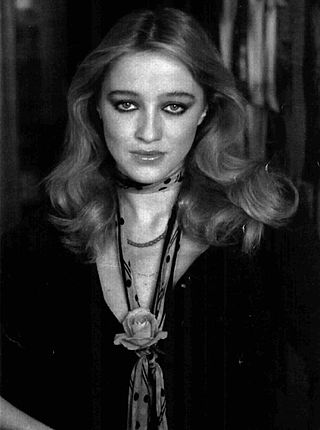
Eleonora Giorgi is an Italian actress.
Fantacollana was a series of fantasy books published in Italy by Editrice Nord. The first number, issued in May 1973, featured The Jewels of Aptor by Samuel R. Delany. The first issues, edited by Riccardo Valla, featured covers by artists such as Karel Thole, Michael Whelan and Frank Frazetta. Valla was replaced in the mid-1970s by Sandro Pergameno, who was followed by Alex Voglino.

Nanni Balestrini was an Italian experimental poet, author and visual artist of the Neoavanguardia movement.

Francesco Pippo, known professionally as Pippo Franco, is an Italian actor, comedian, television presenter, and singer. He made his name first as a musician in the early 1960s, and in the late 1960s began a career in film, starring in a great number of commedia sexy all'italiana, the "sexy comedy" subgenre of Italian comedy. In the 1970s he expanded into television, acting in TV movies and presenting variety shows. His type of comedy borrows heavily from cabaret. Throughout his career he continued to sing, appearing many times at the Sanremo Festival. He has made children's music as well, and has co-written three books on (linguistic) humor.
The Acqui Award of History is an Italian prize. The prize was founded in 1968 for remembering the victims of the Acqui Military Division who died in Cefalonia fighting against the Nazis. The jury is composed of seven members: six full professors of history and a group of sixty (60) ordinary readers who have just one representative in the jury. The Acqui Award Prize is divided into three sections: history, popular history, and historical novels. A special prize entitled “Witness to the Times,” given to individual personalities known for their cultural contributions and who have distinguished themselves in describing historical events and contemporary society, may also be conferred. Beginning in 2003 special recognition for work in multimedia and iconography--”History through Images”—was instituted.
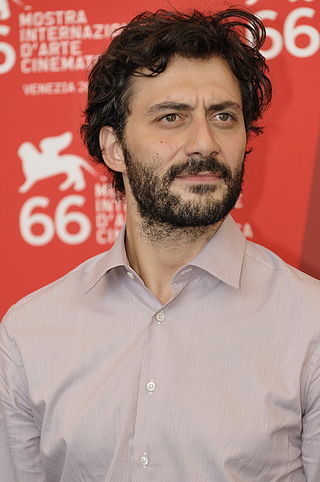
Filippo Timi is an Italian actor, director and writer.
Lucio Maria Attinelli is a journalist and an Italian writer.

Gianni Nazzaro was an Italian singer and actor.

Luca Desiato is an Italian journalist and writer.
Yuri Catania is an Italian photographer, director and creative director working in the fields of fashion and luxury. He won the Cavallo di Leonardo symbol of Milan, for the direction of Best Fashion Movie of the year by Milan Film festival internazionale di Milano on April, 2014. The movie was commissioned by Ermanno Scervino and starring Asia Argento. He was selected by Praz-Delavallade to exhibit some fine art photos from the series New Yorker at ART IS HOPE, at Palais de Tokyo in Paris, on November, 2013. He uses his photography to create street art works with the paste-up technique. He is the author of the land art exhibition "I Gatti di Rovio", more than 60 art installations in the heart of the town.
DeepCon is an Italian science fiction, fantasy and horror fan convention, covering multiple entertainment forms and media, mixed with a dose of actual, real-world science.